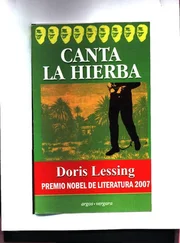In flight from her mother, Lessing left home when she was fifteen and took a job as a nursemaid. Her employer gave her books on politics and sociology to read, while his brother-in-law crept into her bed at night and gave her inept kisses. During that time she was, Lessing has written, “in a fever of erotic longing.” Frustrated by her backward suitor, she indulged in elaborate romantic fantasies. She was also writing stories, and sold two to magazines in South Africa.
Lessing’s life has been a challenge to her belief that people cannot resist the currents of their time, as she fought against biological and cultural imperatives that fated her to sink without a murmur into marriage and motherhood. “There is a whole generation of About the author women,” she has said, speaking of her mother’s era, “and it was as if their lives came to a stop when they had children. Most of them got pretty neurotic—because, I think, of the contrast between what they were taught at school they were capable of being and what actually happened to them.” Lessing believes that she was freer than most people because she became a writer. For her, writing is a process of “setting at a distance,” taking “the raw, the individual, the uncriticized, the unexamined, into the realm of the general.”
In 1937 she moved to Salisbury, where she worked as a telephone operator for a year. At nineteen she married Frank Wisdom, with whom she had two children. A few years later, feeling trapped in a persona that she feared would destroy her, she left her family, remaining in Salisbury. Soon she was drawn to the like-minded members of the Left Book Club, a group of Communists “who read everything, and who did not think it remarkable to read.” Gottfried Lessing was a central member of the group; shortly after she joined, they married and had a son.
During the postwar years, Lessing became increasingly disillusioned with the Communist movement, which she left altogether in 1954. By 1949, Lessing had moved to London with her young son. That year, she also published her first novel, The Grass Is Singing , and began her career as a professional writer.
Lessing’s fiction is deeply autobiographical, much of it emerging out of her experiences in Africa. Drawing upon her childhood memories and her serious engagement with politics and social concerns, Lessing has written about the clash of cultures, the gross injustices of racial inequality, the struggle among opposing elements within an individual’s own personality, and the conflict between the individual conscience and the collective good. Her stories and novellas set in Africa, published during the fifties and early sixties, decry the dispossession of black Africans by white colonials and expose the sterility of the white culture in southern Africa. In 1956, in response to Lessing’s outrageous outspokenness, she was declared a prohibited alien in both Southern Rhodesia and South Africa.
Over the years, Lessing has attempted to accommodate what she admires in the novels of the nineteenth century—their “climate of ethical judgment”—to the demands of twentieth-century ideas about consciousness and time. After writing the Children of Violence series (1952–1959), a formally conventional bildungsroman (novel of education) about the growth in consciousness of its heroine, Martha Quest, Lessing broke new ground with The Golden Notebook (1962). This novel was a daring narrative experiment, in which the multiple selves of a contemporary woman are rendered in astonishing depth and detail. Anna Wulf, like Lessing herself, strives for ruthless honesty as she aims to free herself from the chaos, emotional numbness, and hypocrisy afflicting her generation.
Attacked for being “unfeminine” in her depiction of female anger and aggression, Lessing responded, “Apparently what many women were thinking, feeling, experiencing came as a great surprise.” As at least one critic noticed, Anna Wulf “tries to live with the freedom of a man,” a point Lessing seems to confirm: “These attitudes in male writers were taken for granted, accepted as sound philosophical bases, as quite normal, certainly not as woman-hating, aggressive, or neurotic.”
In the 1970s and 1980s, Lessing began to explore more fully the quasi-mystical insight Anna Wulf seems to reach by the end of The Golden Notebook . Her “inner-space fiction” deals with cosmic fantasies ( Briefing for a Descent into Hell , 1971), dreamscapes and other dimensions ( Memoirs of a Survivor , 1974), and science fiction probings of higher planes of existence (the series Canopus in Argos: Archives, 1979–1983). These reflect Lessing’s interest, since the 1960s, in Idries Shah, whose writings on Sufi mysticism stress the evolution of consciousness and the belief that individual liberation can come about only if people understand the link between their own fates and the fate of society.
Lessing’s other works include The Good Terrorist (1985) and The Fifth Child (1988); she also published two novels under the pseudonym Jane Somers ( The Diary of a Good Neighbor , 1983, and If the Old Could… , 1984). In addition, she has written several nonfiction works, including books about cats, a love since childhood. In the last decade of the twentieth century, Lessing published a variety of books, including The Real Thing (stories, 1992); African Laughter (reportage, 1992); two volumes of autobiography, Under My Skin (1994) and Walking in the Shade (1997); and the novel Mara and Dann: An Adventure (1999).
Ben, in the World , the poignant sequel to The Fifth Child , was published in 2000, followed by the novels The Sweetest Dream (2002), The Grandmothers: Four Short Novels (2003), The Story of General Dann and Mara’s Daughter, Griot and the Snow Dog (2006, sequel to Mara and Dann ), and The Cleft (2007). In 2008 she published Alfred & Emily , an exploration of the lives of her parents through both fiction and memoir.
In 2007, Lessing was awarded the Nobel Prize in Literature. 
On Not Winning the Nobel Prize
The Nobel Lecture
Doris Lessing was awarded the Nobel Prize in 2007. Owing to back problems, she was unable to deliver her lecture in person. The lecture was delivered by her British publisher, Nicholas Pearson, at the Swedish Academy, Stockholm, on December 7, 2007.
I AM STANDING in a doorway looking through clouds of blowing dust to where I am told there is still uncut forest. Yesterday I drove through miles of stumps and charred remains of fires where, in ’56, there was the most wonderful forest I have ever seen, all now destroyed. People have to eat. They have to get fuel for fires.
This is northwest Zimbabwe in the early eighties, and I am visiting a friend who was a teacher in a school in London. He is here “to help Africa,” as we put it. He is a gently idealistic soul, and what he found in this school shocked him into a depression, from which it was hard to recover. This school is like every other built after Independence. It consists of four large brick rooms side by side, put straight into the dust, one two three four, with a half room at one end, which is the library. In these classrooms are blackboards, but my friend keeps the chalks in his pocket, as otherwise they would be stolen. There is no atlas or globe in the school, no textbooks, no exercise books or biros. In the library there are no books of the kind the pupils would like to read, but only tomes from American universities, hard even to lift, rejects from white libraries, or novels with titles like Weekend in Paris and Felicity Finds Love.
Читать дальше
Конец ознакомительного отрывка
Купить книгу












